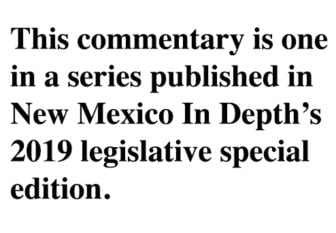
Elizabeth Yakes Jimenez is interim director of The University of New Mexico Cradle to Career Policy Institute.
The challenge is clearer than ever: A judge has ruled that New Mexico – once again ranked last for child well-being – fails to provide its children with a sufficient education, and must do better. Fortunately, after years of austerity, lawmakers expect to have more than a billion new dollars to allocate this year, along with a new governor who brings a fresh mandate and agenda. A policy window is opening, and substantial change is possible.
During this special moment, lawmakers should prioritize early childhood. The science is clear – the first years of life set the brain’s foundation for future success in profound ways, and reliable access to care and education supports family economic and educational attainment. New Mexico has numerous programs to serve young children, including home visiting for families with new babies, child care assistance for low-income families, federal Head Start services, pre-k for 3- and 4-year-olds, K-3 Plus programs that lengthen the school year, and services for children with disabilities or developmental delays. To best serve all families who would benefit from them, though, these systems must grow through increased funding and sustained attention to quality.

Hailey Heinz is a research scientist The University of New Mexico Cradle to Career Policy Institute.
Even as broad consensus has grown around the importance of early learning, pay and working conditions for early childhood educators have not kept pace with this consensus. Although New Mexico lacks reliable data on its early childhood workforce, the information we do have suggests many educators are themselves in poverty – despite being the front line workers in one of New Mexico’s central strategies for raising up its children. This contributes to high turnover, which is disruptive to children in care. Funding for wage supplements and scholarships that support these educators should be priorities, as well as efforts to collect reliable workforce data. We at the UNM Cradle to Career Policy Institute are in the early stages of such an effort.
A well-supported workforce also helps limit suspension and expulsion in early childhood. National research has found such practices are widespread and disproportionately affect boys of color. Locally, our researchers surveyed early childhood educators, who reported that about 25 percent of preschoolers exhibit persistently challenging behavior, and about 7 children per 1,000 had been expelled. Educators want and need more consultation and training on behavior management and special needs, and robust funding for supports in this area is central to expanding an inclusive early childhood system.
Preparing young children for kindergarten is a crucial first step, but it is just that. When children enter the K-12 system, they must be met with culturally and linguistically appropriate education, well-supported teachers, and schools with sufficient resources to support vulnerable children. These are among the suggested remedies arising from the recent court decision, and should be priorities for this Legislature.
Across systems, data are essential to learn what is most effective, and to make adjustments.
 New Mexico has built the foundations of an early childhood integrated data system, but to be ultimately useful it will need policy attention and resources. And although New Mexico collects copious data on K-12 education, the state has been bitterly divided on the usefulness and appropriateness of standardized testing data as a measure of learning. This Legislature should engage deeply with questions of how learning can most effectively be measured, especially for children experiencing trauma and instability. CCPI is working with some of New Mexico’s charter schools that serve primarily high-risk adolescents to evaluate alternative ways to assess learning.
New Mexico has built the foundations of an early childhood integrated data system, but to be ultimately useful it will need policy attention and resources. And although New Mexico collects copious data on K-12 education, the state has been bitterly divided on the usefulness and appropriateness of standardized testing data as a measure of learning. This Legislature should engage deeply with questions of how learning can most effectively be measured, especially for children experiencing trauma and instability. CCPI is working with some of New Mexico’s charter schools that serve primarily high-risk adolescents to evaluate alternative ways to assess learning.
Substantial change is possible, and it should start with early childhood, culturally and linguistically appropriate practices, and thoughtful assessment that equips educators with actionable data.
Elizabeth Yakes Jimenez is interim director of The University of New Mexico Cradle to Career Policy Institute. Hailey Heinz is a research scientist there. The Institute produces research, evaluation, and analysis that supports thoughtful and informed policymaking for children and families. The views in this column are the authors’ alone and do not reflect the view or opinions of New Mexico In Depth.